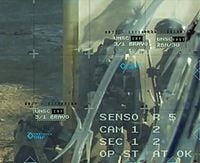Identification friend or foe: Difference between revisions
From Halopedia, the Halo wiki
NightHammer (talk | contribs) m (Another page that could use cleanup) |
|||
| Line 18: | Line 18: | ||
*''[[Halo 4]]'' | *''[[Halo 4]]'' | ||
**''[[Spartan Ops]]'' | **''[[Spartan Ops]]'' | ||
*''[[Halo 5: Guardians]]'' | |||
*''[[Halo: Shadow of Intent]]'' | |||
==Sources== | ==Sources== | ||
<references/> | <references/> | ||
[[Category:Communications technology]] | [[Category:Communications technology]] | ||
Revision as of 21:34, December 7, 2015
Identification friend or foe, or IFF, is a system used by the UNSC to tag friendly or hostile units for easy identification on a heads-up display or motion tracker.[1][2] The equipment of a friendly unit generates a signal on a specific frequency, which is interpreted as a "friendly" signal by the receiver. If a signal is not generated, then unit is tagged as a hostile. Friendly units appear as yellow dots on the motion tracker, while the crosshairs of a HUD turn green when pointed at them. Hostile units show up as red on a motion tracker, and the HUD crosshairs turn red.
In the Halo 2 level, Gravemind, John-117 managed to rescue a dozen UNSC prisoners of war. This was due to Cortana identifying their "IFF transponders", which were still with the Marines.
Most UNSC ships, ranging from civilian freighters to UNSC Navy warships, possess IFF transponders displaying their identity, allegiance, and classification.[3]
List of appearances
- Halo: Combat Evolved (First appearance)
- Halo: The Flood
- Halo 2
- Halo 3
- Halo: Contact Harvest
- Halo 3: ODST
- Halo: Reach
- Halo 4
- Halo 5: Guardians
- Halo: Shadow of Intent
Sources
- ^ IFF at Wikipedia
- ^ Halo: Contact Harvest, page 178
- ^ Halo: Contact Harvest, page 176
